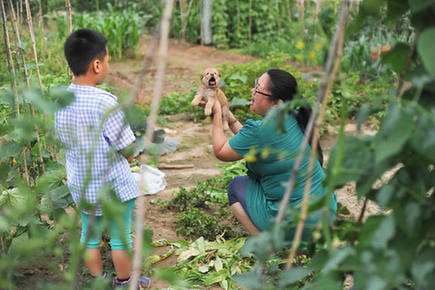The Happy Farm
By staff reporter SEBASTIEN ROUSSILLAT
For several years, a computer game about farming has been on the minds and lips of millions of Chinese people, young and old alike. In “The Happy Farm” players tend crops and steal vegetables from their neighbors to win points. It is so popular that some players wake up in the middle of the night just to play the game and steal from other players while they sleep. Today, many Chinese have their own, real, Happy Farms.
 |
|
Mrs. Chen and her son play with a puppy at a farm in western Beijing, where she leases a plot of land. |
A Farm of Her Own
It is Saturday. Yan Zhen is leaving for her grounds at the edge of Beijing. Her land? Rather, her rental: she leases a parcel of farmland for RMB 800 per year in the Happy Farm in the western suburbs of Beijing, an area of 15 square meters. “You have to distinguish between many kinds of farms,” Yan Zhen said. There are some farms where you can rent a parcel of land entirely for yourself. The fertilizers, tools and seeds for plantation are provided in exchange for a deposit. If you don’t have green thumbs, you can pay a farmer to take care of the field; the tenant doesn’t do anything except pick up the vegetables and visit the countryside with their friends or family on weekends. Other farms are only open for picking. This means that you don’t have to rent a plot; you just bring your basket and pick the fruits or vegetables you want before paying a fee.
In the first case, it isn’t a question of owning land, but just renting. The farmer keeps the ownership rights, and the renter pays for the right to cultivate the land. Often these rental farms are nothing more than a plot of land, sometimes with a cabin, or in some cases a greenhouse. So it is possible to spend the entire weekend there with your family.
Concerns about Food Safety
Planting one’s own vegetables and transporting them 40 kilometers back to a downtown home can seem a bit eccentric if you know how many small markets and supermarkets there are at the heart of the Chinese city. “I think it’s because for several years, we Chinese have been troubled by problems of food safety. When you have planted your own vegetables and watched them grow, and know what fertilizers have been used, and picked them with your own hands, this is an ultimate guarantee of safety,” Yan Zhen said.
Food and health are not joking matters in China. In recent years there have been many food scandals, some involving international brands like KFC and McDonalds. More and more people are turning towards organic foods, which are a growing presence in Chinese supermarkets.
The phenomenon of urbanites renting agricultural land is spreading throughout China. Some city dwellers want to get back in touch with nature, including those born in the countryside who wish to return to the earth; some long for the country life and healthy eating, and others want their children to experience farm work and the pleasure of harvesting what one has planted. Some urban schools also lease plots to acquaint students with working the earth.
“At first, we got this plot for our child, so he could come planting vegetables with us and have a taste of experience in the countryside. Now that he is 10 years old, he doesn’t come anymore. But my husband and I go all the time to pass time and enjoy eating fresh vegetables we planted ourselves,” Yan Zhen said.
